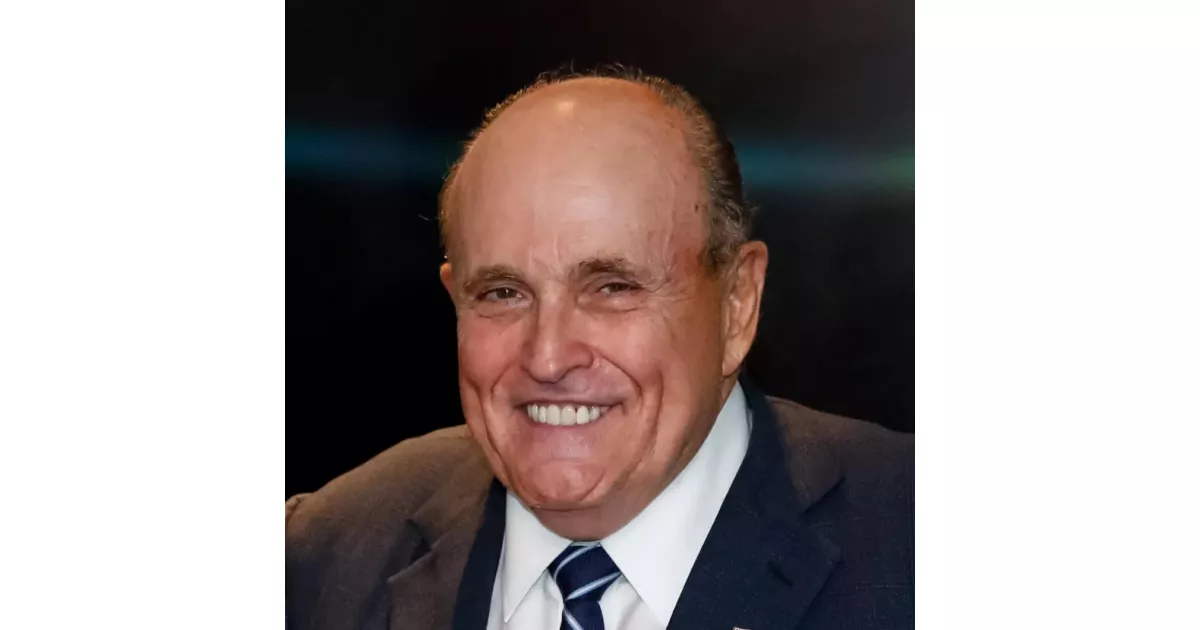How Rudy Giuliani built a successful career. Explore key moments that defined the journey.
Rudy Giuliani is an American politician and disbarred lawyer best known for serving as the 107th Mayor of New York City from 1994 to 2001. Prior to his mayoral tenure, he held significant positions within the Department of Justice, including United States Associate Attorney General and United States Attorney for the Southern District of New York. While initially admired for his leadership, particularly after 9/11, his later career has been marked by controversy, leading to his disbarment.
1968: Volunteered for Robert F. Kennedy's campaign
In 1968, Giuliani volunteered for Robert F. Kennedy's U.S. presidential election campaign as a Democrat.
December 8, 1980: Switched party affiliation to Republican
On December 8, 1980, one month after the 1980 U.S. presidential election brought Republicans back to power in Washington, Giuliani switched his party affiliation from independent to Republican.
February 25, 1985: Start of the Mafia Commission Trial
On February 25, 1985, the Mafia Commission Trial began, with Giuliani indicting eleven organized crime figures under the RICO Act.
January 1989: Giuliani Resigned as U.S. Attorney and Joined White & Case
In January 1989, Rudy Giuliani resigned as U.S. Attorney as the Reagan administration ended. He then joined the law firm White & Case in New York City as a partner.
September 1989: Giuliani Won Republican Primary for NYC Mayor
In September 1989, Rudy Giuliani won the Republican Party primary election against Ronald Lauder in a campaign marked by claims that Giuliani was not a true Republican (RINO) after an acrimonious debate.
1989: Giuliani charged Milken under RICO Act
In 1989, Rudy Giuliani charged Michael Milken under the RICO Act with 98 counts of racketeering and fraud. This case was highly publicized, and Milken was indicted by a grand jury on these charges.
1989: Giuliani Sought Endorsement from Lubavitcher Rebbe
In 1989, during his campaign, Rudy Giuliani visited the Lubavitcher Rebbe, Rabbi Menachem Mendel Schneerson, seeking his blessing and endorsement.
May 1990: Giuliani Joined Anderson Kill Olick & Oshinsky
In May 1990, Rudy Giuliani joined the law firm Anderson Kill Olick & Oshinsky, also in New York City, after leaving White & Case.
1991: Crime Rates Started to Drop Under Dinkins
In 1991, crime rates in New York City started to drop under the Dinkins administration, three years before Rudy Giuliani took office.
1994: Giuliani's First Term as Mayor
In 1994, Rudy Giuliani began his first term as mayor of New York City. The New York City Police Department adopted an aggressive enforcement/deterrent strategy based on James Q. Wilson's "broken windows" approach.
1995: Pataki Becomes Governor
In 1995, George Pataki became governor, marking the first time since John Lindsay and Nelson Rockefeller that the positions of mayor and governor were held simultaneously by Republicans.
February 1996: Hauer's Memo Recommending Brooklyn Location
In February 1996, a memo from Jerome Hauer recommended locating the emergency command center in Brooklyn, citing security concerns about buildings in Lower Manhattan. The memo stated, "The [Brooklyn] building is secure and not as visible a target as buildings in Lower Manhattan."
1996: Bratton on Time Magazine Cover
In 1996, Bill Bratton was featured on the cover of Time magazine. Giuliani reportedly forced Bratton out after two years.
1996: CompStat Initiative Won Award
In 1996, the CompStat initiative won the Innovations in Government Award from Harvard Kennedy School.
May 1997: Giuliani Blames Hauer for WTC Location Decision
In May 1997, Giuliani attributed the responsibility for selecting the location of the New York City Office of Emergency Management headquarters inside 7 World Trade Center to Jerome M. Hauer. Hauer, who served under Giuliani from 1996 to 2000, disputed this account, claiming he had recommended a location in Brooklyn but was overruled by Giuliani.
October 1997: Giuliani's High Approval Rating
In late October 1997, a Quinnipiac University Polling Institute poll showed Rudy Giuliani with a 68 percent approval rating. Also, 70 percent of New Yorkers were satisfied with life in the city and 64 percent said things were better in the city compared to four years previously.
November 1998: Moynihan Announced Retirement
In November 1998, four-term incumbent Democratic U.S. Senator Daniel Patrick Moynihan announced his retirement, and Rudy Giuliani immediately indicated an interest in running in the 2000 election for the open seat.
1998: Equal Benefits for Domestic Partners
In 1998, Rudy Giuliani codified local law by granting all city employees equal benefits for their domestic partners.
April 1999: Giuliani Formed Senate Exploratory Committee
In April 1999, Rudy Giuliani formed an exploratory committee in connection with his potential Senate run.
January 2000: Giuliani Ahead of Clinton in Senate Race Polling
In January 2000, polling for the Senate race showed Rudy Giuliani nine points ahead of Hillary Clinton.
April 2000: Clinton Gained in Polls
By April 2000, reports showed Hillary Clinton gaining upstate and generally outworking Rudy Giuliani, who said his duties as mayor prevented him from campaigning more. Clinton was now eight to ten points ahead of Giuliani in the polls.
2000: Hauer's Tenure Ends
In 2000, Jerome Hauer's tenure under Giuliani ended, having served since 1996 before being appointed as New York City's first director of emergency management. After his tenure ended he has refuted Giuliani's account of him recommending the World Trade Center as a location for the emergency center.
2000: Giuliani Considered Senate Run
In 2000, Rudy Giuliani considered running for the open Senate seat after Daniel Patrick Moynihan announced his retirement.
2001: Term Limits
In 2001, Giuliani was ineligible to run for a third term as mayor due to term limits.
2001: Giuliani's Last Year as Mayor
In 2001, Rudy Giuliani's term as mayor of New York City concluded.
2003: Basis for 2003 Invasion of Iraq
As of June 2007, Giuliani remained one of the few candidates for president to unequivocally support the basis for the 2003 invasion of Iraq and the execution of the war.
2004: Campaigning on Bush's Behalf
After campaigning on Bush's behalf in the 2004 U.S. presidential election, Giuliani was reportedly the top choice for U.S. Secretary of Homeland Security after Tom Ridge's resignation.
2004: Republican National Convention in New York City
In 2004, Giuliani and Pataki were instrumental in bringing the Republican National Convention to New York City. Giuliani spoke at the convention and endorsed President George W. Bush for re-election, recalling his immediate reaction after the World Trade Center towers fell.
March 2006: Formation of Iraq Study Group
In March 2006, Congress formed the Iraq Study Group (ISG), a bipartisan panel including Giuliani. The ISG unanimously concluded that the situation in Iraq was grave and deteriorating, calling for changes in the primary mission and allowing the United States to begin to move its forces out of Iraq.
May 2006: Giuliani Resigns from Iraq Study Group
In May 2006, after missing all of the Iraq Study Group's meetings, Giuliani resigned, citing "previous time commitments". His fundraising schedule, which raised $11 million in speaking fees over fourteen months, conflicted with his participation in the panel.
November 2006: Giuliani Announces Exploratory Committee for 2008 Presidential Run
In November 2006, Giuliani announced the formation of an exploratory committee towards a run in the 2008 U.S. presidential election.
2006: Giuliani Starts Solutions America Website
In 2006, Giuliani started a website called Solutions America to help elect Republican candidates.
January 2007: Giuliani as Cheerleader for Iraq War Handling
In January 2007, Newsweek described Giuliani as "one of the most consistent cheerleaders for the president's handling of the war in Iraq".
February 2007: Giuliani Confirms Presidential Run
In February 2007, Giuliani filed a "statement of candidacy" and confirmed on the television program Larry King Live that he was running for president.
June 2007: Giuliani Supports 2003 Invasion of Iraq
As of June 2007, Giuliani remained one of the few candidates for president to unequivocally support the basis for the 2003 invasion of Iraq and the execution of the war.
November 7, 2007: Giuliani Receives Endorsement from Pat Robertson
On November 7, 2007, Giuliani's campaign received an endorsement from evangelist, Christian Broadcasting Network founder, and past presidential candidate Pat Robertson. This was seen as a potentially key development in the race, giving credence that evangelicals and other social conservatives could support Giuliani.
January 8, 2008: New Hampshire primary
On January 8, 2008, despite focusing on later primary states, Giuliani competed in the New Hampshire primary, finishing a distant fourth with 9 percent of the vote.
January 29, 2008: Florida Republican primary
On January 29, 2008, Giuliani finished third in the Florida Republican primary, trailing behind McCain and Romney, with only 15 percent of the vote.
June 2008: Sought to retire campaign debt
In June 2008, Giuliani sought to retire his $3.6 million campaign debt by proposing to appear at Republican fundraisers during the 2008 general election, with part of the proceeds going towards his campaign.
November 2008: Hypothetical Matchup Poll
A November 2008 Siena College poll indicated that Governor David Paterson would have just a slight lead over Giuliani in a hypothetical matchup.
2008: Presidential Campaign Debt
By the end of March 2009, Giuliani's presidential campaign was still $2.4 million in arrears, after the 2008 presidential campaign.
2008: Appearance fees dropped
Following the end of his presidential campaign in 2008, Giuliani's "high appearance fees dropped like a stone".
2008: Exploratory Committee Run in the 2008 Presidential Election
In November 2006, Giuliani announced the formation of an exploratory committee towards a run in the 2008 U.S. presidential election. He filed a statement of candidacy in February 2007 and confirmed on the television program Larry King Live that he was running for president.
January 2009: Decision on gubernatorial run delayed
In January 2009, Giuliani announced he would delay his decision on a gubernatorial run for another six to eight months, citing fairness to the current governor.
February 2009: Fifteen-Point Lead
By February 2009, a Siena College poll indicated that Paterson was losing popularity, and showed Giuliani with a fifteen-point lead in a hypothetical gubernatorial contest.
March 2009: Presidential campaign debt
By the end of March 2009, Giuliani's presidential campaign was still $2.4 million in arrears.
August 2009: Conflicting reports on gubernatorial run
By late August 2009, conflicting reports persisted regarding Giuliani's likelihood of running for governor.
December 23, 2009: Announced no run for office
On December 23, 2009, Giuliani announced that he would not seek any office in 2010, citing commitments to Bracewell & Giuliani and Giuliani Partners, signaling a possible end to his political career.
2009: Criticized Obama administration
In 2009, Giuliani criticized the Obama administration and U.S. Treasury Secretary Timothy Geithner for lacking executive competence in handling the 2008 financial crisis.
2010: Midterm endorsements and campaigning
During the 2010 midterm elections, Giuliani endorsed and campaigned for Bob Ehrlich and Marco Rubio.
2010: Possible Gubernatorial Bid
Giuliani considered a 2010 New York gubernatorial bid but did not confirm his intentions.
2010: Republican Resurgence
In April 2009, Giuliani predicted a Republican resurgence in 2010.
October 11, 2011: Announced he was not running for president
On October 11, 2011, Giuliani announced that he was not running for president, citing the challenges of being a moderate in the GOP primaries.
2011: Advised Keiko Fujimori
In 2011, Giuliani's consultancy work included advising Keiko Fujimori with her presidential campaign during the Peruvian general election.
2012: Possible Presidential Bid
Giuliani considered a 2012 presidential bid but did not confirm his intentions.
December 9, 2016: Removed name from Cabinet consideration
On December 9, 2016, Trump announced that Giuliani had removed his name from consideration for any Cabinet post.
2018: Giuliani Paid by Fraud Guarantee
In 2018, Rudy Giuliani was paid $500,000 to consult for Lev Parnas' company, Fraud Guarantee. Trump supporter attorney Charles Gucciardo paid Giuliani in two $250,000 payments on behalf of Fraud Guarantee.
May 2019: Giuliani Urges Ukraine to Investigate Burisma and Manafort
Beginning in at least May 2019, Rudy Giuliani urged Ukraine's president, Volodymyr Zelenskyy, to investigate the oil company Burisma, which had Joe Biden's son Hunter Biden on its board, and to check for irregularities in the investigation of Paul Manafort. Giuliani stated that these investigations would benefit his client's defense and had the support of Donald Trump.
October 2019: Giuliani Hires Jon Sale for Impeachment Inquiry
In October 2019, Rudy Giuliani hired former Watergate prosecutor Jon Sale to represent him in the House Intelligence Committee's impeachment investigation. The committee issued a subpoena to Giuliani for documents related to the Ukraine scandal.
2019: Giuliani Represented Alejandro Betancourt López
In late 2019, Rudy Giuliani represented Venezuelan businessman Alejandro Betancourt López, meeting with the Justice Department to ask them not to bring charges against him.
February 16, 2021: Giuliani Not Actively Involved in Trump's Legal Cases
As of February 16, 2021, it was reported that Rudy Giuliani was not actively involved in any of Donald Trump's pending legal cases.
June 2021: Giuliani's Law License Suspended
In June 2021, Rudy Giuliani had his license to practice law suspended in the state of New York, pending an investigation related to his efforts to overturn the results of the 2020 presidential election.
July 2, 2024: Giuliani Disbarred in New York
On July 2, 2024, Rudy Giuliani was disbarred in the state of New York.
September 26, 2024: Giuliani Disbarred in District of Columbia
On September 26, 2024, Rudy Giuliani was disbarred in the District of Columbia under reciprocal discipline.
Mentioned in this timeline

Donald John Trump is an American politician media personality and...

Purdue Pharma originally the Purdue Frederick Company was a privately...

Oprah Winfrey is an influential American talk show host television...
Fox News Channel FNC is a conservative American news and...
Ukraine is a country in Eastern Europe the second-largest on...

Marco Rubio is an American politician attorney and diplomat He...
Trending
10 seconds ago Kimberly Birrell faces Tatjana Maria in WTA Dubai 2026 first-round match.
2 hours ago Alaska Airlines Expands International Routes from St. Louis and Introduces New Spring Menus.

3 hours ago Mertens vs. Bouzkova: WTA Dubai 2026 Prediction, Odds, and Preview of the Match
3 hours ago Top Reliable Used Cars for Value in 2026: A Comprehensive Guide

57 seconds ago Janice Tjen Dominates Dayana Yastremska in Dubai WTA 2026 Round 1 Match
4 hours ago Linda Noskova Advances in WTA Dubai: Predictions, Betting Odds, and Tournament Info
Popular

Kid Rock born Robert James Ritchie is an American musician...
Randall Adam Fine is an American politician a Republican who...

Pam Bondi is an American attorney lobbyist and politician currently...

Barack Obama the th U S President - was the...
The Winter Olympic Games a major international multi-sport event held...

XXXTentacion born Jahseh Dwayne Ricardo Onfroy was a controversial yet...
